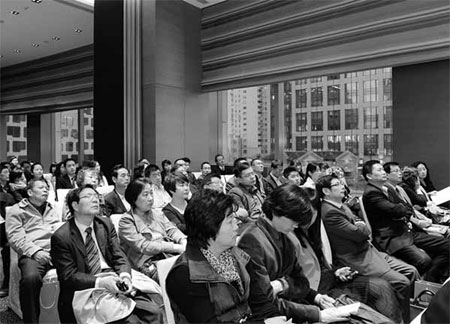Looking abroad for a new home
Updated: 2013-04-08 07:57
By Wang Ying and Hu Yuanyuan (China Daily)
|
||||||||
|
A Chinese woman watching a presentation of an overseas project at a cocktail party in central London. It costs buyers an average of 20 years to get their investment back from rental incomes in London. The biggest advantage about having a property investment in the UK is that there is no capital gains tax for sales by the non-domiciled. In contrast, China has just introduced a new policy of levying a 20 percent income tax on home sales. Provided to China Daily |
|
An overseas project presentation in Shanghai attracted many potential homebuyers. The Chinese property market is experiencing a new round of tightening. The central government announced on March 1 a levy of a 20 percent tax on gains on pre-owned house sales. Provided to China Daily |

Chinese lured by comparatively cheaper houses elsewhere, report Wang Ying and Hu Yuanyuan
Properties in the former US industrial city Detroit started to fall to as low as $100, attracting Chinese investors who have found their investments in the Chinese property market becoming harder under the central government's tightening policies.
As real estate hits rock bottom in Detroit, Chinese investors are planning to purchase properties there, the People's Daily reported.
There are more than a dozen properties priced lower than $100, with some extreme cases on offer for $1.
Some Chinese investors are linking up to buy several properties there. Given that some wealthy Chinese are happy to spend $1,100 on a single pair of designer shoes, the opportunity of buying two Detroit properties with change to spare is not being ignored, the China Central Television reported.
The Chinese property market is experiencing a new round of tightening. The central government announced on March 1 a levy of a 20 percent tax on gains on pre-owned house sales.
Experts suggest homebuyers should be cautious before undertaking an overseas shopping spree because there is "no such thing as a free lunch".
"For instance, Detroit is extremely cold in winter with the lowest temperature reaching minus 30 degrees Celsius and the broken economy means there is a high rate of unemployment and crime," said Tian Xue, an associate director and head of international project marketing at Knight Frank China.
It may be true that some Chinese buyers are zeroing in on the Detroit property market but James Macdonald, head of Savills research team in China, is skeptical about the magnitude of the trend.
"Typically, when property buyers go overseas, they prefer key markets such as New York, Los Angeles, San Francisco, Miami, Seattle, Portland, San Diego and Boston. These markets are more expensive but comparatively stable and they have diversified populations. In some cases these markets have a large Chinese population and better education systems," said Macdonald.
Tian said up to 80 percent of people looking for overseas property investments want to use them for themselves. These people are either buying properties for emigration purposes or for their children's future educational use.
An extreme example of that came in a CCTV report that revealed a Chinese mother buying a $6.5 million apartment in Manhattan, New York's most expensive district, ahead of her 2-year-old daughter's future university life.
It is very unlikely that nouveau riche Chinese will buy properties in a city that has an unstable economy and social environment just because they are cheap, such as Detroit in the United States or on the island of Cyprus in the European Union, said analysts.
Maureen Yeo, associate director of international project marketing in Knight Frank's Beijing office, said there was a surge in pure investment-oriented purchases among the Chinese.
"Before, most Chinese who bought overseas properties did so, especially in the UK, the US, Canada and Australia, for their children's education or to emigrate to. But after the central government further tightened real estate policies, more are tending to diversify their investment portfolios, given the rising policy risks," said Yeo
The new policy of levying a 20 percent income tax on home sales is not actually new in China. "It was introduced as early as 2010 but people selling their home have had the option of paying a 20 percent capital gain from the transaction or paying a 1 to 2 percent tax on the total property value, according to Chen Shin Ling, general manager of Taiwan-based Yungching Real Estate Agency in Shanghai.
"While the 20 percent tax will not directly lead to individuals buying properties overseas, a tightly controlled and heavily taxed market is less attractive to buyers than a more open, more lightly taxed market. So the combination of all the regulations designed to cool the market over the last five years will have encouraged buyers to look at overseas markets," said Macdonald.
According to him, one of the more important considerations is the prospects for some of these markets, which are relatively cheap by historical standards and also cheap when viewed in yuan terms given the appreciation of the Chinese currency over the last eight years
Lu Hang, vice-chairman and president of real estate services provider Century 21 China Real Estate, dismissed worries about a trading slump after the imposition of the 20 percent tax on selling a home.
"The 20 percent tax on gains may sound a lot at first but, as a matter of fact, a gains tax for selling a house in the secondary market in the US is more than 20 percent," said Lu.
According to him, in a sophisticated property market, there will be not so many new houses for trading. Therefore, the secondary market will be the main force in buying and selling homes as China's property market develops and matures," said Lu.

It seems there are many choices for investors in buying properties overseas, such as in the US, Australia, Canada, the UK, Europe and Singapore among a myriad of opportunities, but analysts suggest Chinese investors should choose traditional locations and diversify to spread risk.
However, the recent policy adjustment as well as a worsening economic environment might reduce the choice. Canada has suspended all new immigration applications recently, which will hold back many immigration-oriented investors at least over the short term.
Likewise, the increase in stamp duty for foreign investors in Singapore from 13 percent to 18 percent means an increase in investment costs and higher thresholds for foreign investors, in stark contrast with local first time homebuyers' 3 percent stamp tax, according to a China media report.
"Tax, regulations, deductions, property/asset management, procedures and tax rates and breaks can be very different and it is advisable to engage experts such as an accountant, lawyer, estate agent et cetera before buying to ensure you are getting the best deal," said Macdonald.
Local knowledge is also very important. It is best to invest where you or somebody close to you - friends and/or family - knows, he added.
The fallout from the European debt crisis may cool the eagerness of investors wanting to buy property in the continent. Properties in the UK have been hit hard in the crisis with only London staying unscathed. As the traditional European financial center, property values in central London rose 12.9 percent year-on-year in 2012, according to Tian.
It probably cost buyers an average of 20 years to get their investment back from rental incomes in London. The biggest advantage about having a property investment in the UK is that there is no capital gains tax for sales by the non-domiciled, said Yeo.
Properties in Australia are also steady and rising, according to Tian. Even during the most severe time of the last financial crisis in 2008, property values in Australia edged down just 2 percent, while properties in the UK and the US slumped between 20 and 30 percent.
"However, they have a higher than average mortgage rate of between 6.5 percent and 7 percent compared with that in China of 5 percent, between 4 and 5 percent in the US and between 3 and 4 percent in the UK, which means more cash pressure on investors," Tian said.
Higher yields in markets such as the US, Canada, the UK and Europe, possible permanent residency depending upon the type of investment - such as a green card - and comparatively less expensive investments, plus the fact that Western governments are very eager to attract investment and so have friendly overseas investment policies, combine to make certain overseas property markets enticing, said Macdonald.
The number of overseas real estate companies attending the annual Beijing International Property Immigration and Investment Expo/Spring this week will surge 30 percent from last year, lured by China's ballooning wealthy population, the expo's sponsor told China Daily.
"More than 200 booths have been booked by overseas companies, hitting a new record," said Wei Kefei, director of the expo's international department.
In addition to the traditional exhibitors from the US, Canada and Australia, there are new participants from East Europe this year, such as Lithuania, Latvia and Bulgaria.
The tightening Chinese measures, according to Wei, may further strengthen some people's determination to buy property overseas.
"But the recent policy impact will not be huge because most Chinese buying overseas properties are not doing so purely for investment purposes," said Wei. "There is an increasing number of purchases because of the polluted environment at home."
Analysts also remind investors looking to emigrate that there is hardly any country that guarantees a green card simply for investing in a property within its borders.
The effects of a flurry of Chinese buying homes abroad is being felt outside the Chinese mainland, pushing up real estate prices in Southeast Asia, Australia and New Zealand, according to a report by Knight Frank.
Partly fueled by inflows of Chinese investment, prime real estate values in Jakarta rose 38 percent in 2012, compared with 20 percent in Bali and 12.7 percent in Auckland, New Zealand. Even Hong Kong, where legislation designed to limit foreign real estate investment came into effect this year, saw gains of 8.7 percent in the prime sector, the report showed.
Top markets worldwide such as London and New York remain as havens for investors from around the world. Analysts are seeing signs of a resurgence in prime markets elsewhere as well following inflows of capital from emerging economies in Asia and the Middle East, according to the report.

 In Photos: 7.0-magnitude quake hits Sichuan
In Photos: 7.0-magnitude quake hits Sichuan
 Li Na on Time cover, makes influential 100 list
Li Na on Time cover, makes influential 100 list
 FBI releases photos of 2 Boston bombings suspects
FBI releases photos of 2 Boston bombings suspects
 World's wackiest hairstyles
World's wackiest hairstyles
 Sandstorms strike Northwest China
Sandstorms strike Northwest China
 Never-seen photos of Madonna on display
Never-seen photos of Madonna on display
 H7N9 outbreak linked to waterfowl migration
H7N9 outbreak linked to waterfowl migration
 Dozens feared dead in Texas plant blast
Dozens feared dead in Texas plant blast
Most Viewed
Editor's Picks

|

|

|

|

|

|
Today's Top News
Live report: 7.0-magnitude quake hits Sichuan, heavy casualties feared
Boston suspect cornered on boat
Cross-talk artist helps to spread the word
'Green' awareness levels drop in Beijing
Palace Museum spruces up
First couple on Time's list of most influential
H7N9 flu transmission studied
Trading channels 'need to broaden'
US Weekly

|

|









